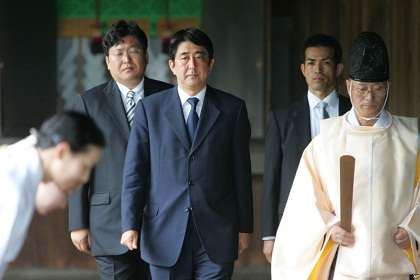A visit by Japanese Prime Minister Shinzo Abe’s to the flashpoint Yasukuni shrine in Tokyo Thursday prompted China to condemn the move, saying it glorifies Japan’s "history of militaristic aggression".
A visit by Japanese Prime Minister Shinzo Abe's to the flashpoint Yasukuni shrine in Tokyo Thursday prompted China to condemn the move, saying it glorifies Japan's "history of militaristic aggression".
"We strongly protest and seriously condemn the Japanese leader's acts," Beijing's foreign ministry spokesman Qin Gang said in a statement immediately  after Abe's visit to the shrine.
after Abe's visit to the shrine.
China will make "solemn representations" to Japan over his actions, the ministry said.
Yasukuni is believed to be the repository of around 2.5 million souls of Japan's war dead, most of them common soldiers but also including several high-level officials executed for war crimes after World War II, who were enshrined in the 1970s.
"The essence of Japanese leaders' visits to the Yasukuni shrine is to beautify Japan's history of militaristic aggression and colonial rule," Qin said.
China's ruling Communist Party seeks to bolster its public support by tapping into deep-seated resentment of Japan for its brutal invasion of the country in the 1930s.
Before and during World War II Japanese forces swept through much of east Asia, where their treatment of both civilian populations in occupied areas and prisoners of war was appalling, with the Nanjing Massacre one of the worst atrocities recorded.
According to estimates by Chinese government researchers, China lost 20.6 million people directly from the war.